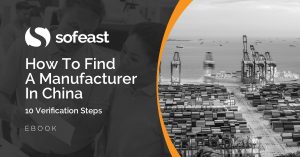In part 6 of our mini-series of podcast episodes about vetting Chinese suppliers, I’m discussing social compliance audits.
After regular factory audits are done on a prospective supplier, it may make sense to assess their social compliance, too. But are these audits into things like legal practices and health & safety truly everything that they promise?
Looking in detail at social compliance audits, their benefits, and their weaknesses
Many of today’s larger brands perform social compliance audits on-site at their supplier’s factory as a standard activity. With a lot of scrutiny on supply chains because of numerous high-profile safety lapses and other problems, it’s more important than ever for brands to insulate themselves from practices that could harm them.
Going into a supplier and making them aware that they need to reach a certain standard pertaining to legalities, health & safety, environmental care, etc, sounds like a perfect way to assure that your supply chain is ethical and compliant, but the rigid nature of standards can lead to corruption and abuse by suppliers if passing is all that stands between winning or losing a large order.
So, are social compliance audits beneficial? They can be, but it’s complicated and it depends on your approach.
Listen to this episode right here 👇👇👇
In summary, we cover the following in this episode:
- Introducing WHAT a social compliance audit is. Some examples of the 3 ‘big’ circumstances that importers want to avoid: Child labor, forced labor, and dangerous working conditions.
- Why health and safety is an investment, as the cost of improving it is often less than that of paying for injured or sick staff, etc.
- How SC audits sometimes put too much emphasis on things that don’t matter so much, such as high levels of overtime being flagged as a negative even though it’s driven by the staff wanting to work more hours rather than being forced to.
- Why rigid compliance standards and pass/fail results can actually cause abuse by forcing suppliers to lie (for instance, about overtime) in order to pass.
- The ‘real’ goal of the audits. This could be as simple as having a supplier who clearly strives to improve and provides a safe workplace.
- Have SC audits become a bit of a ‘racket’ for large testing groups?
- Social and ethical standards are improving naturally in places like China and Vietnam, therefore this is good news for buyers. However, SC audits can muddy the waters by insisting on adherence to unrealistic standards in a developing country and, in fact, encourage lying or corruption.
- Exploring a better, more holistic way to approach social compliance audits which is likely to be less open to abuse and more likely to lead to positive changes. An example would be auditing the supplier, but not making it a pass/fail situation, informing them of how they could improve and suggesting that this is beneficial, giving them a chance to make changes, and then re-auditing. You not only get a social compliance audit result (which covers you) but also encourage the supplier to improve rather than holding a lot of short-term threats over their heads (which actually improves your supply chain as a whole) which merely encourages lies to make the grade.
“What else can I read about social compliance auditing?”
As you can see, I have my reservations about this form of auditing in many cases. I have written more on the topic here:
- Read more about social compliance audits’ negative effects.
- I explained why social compliance audits don’t work!
- Read about the value of worker interviews during social compliance audits.
*****
Does your business use social compliance audits on suppliers in China or elsewhere? Have you found them to be truly effective, or are they more of a box-ticking exercise? Let me know, please, by leaving a comment.
Subscribe to the podcast
There are more episodes to come, so remember to subscribe! You can do so in your favorite podcast apps here:
- Apple Podcasts
- Spotify
- Stitcher
- Google Podcasts
- TuneIn
- The podcast’s website at China Manufacturing Decoded
Are you wondering how to find a manufacturer in China who is well-suited to your needs and can also deliver on their promises?
Sofeast has developed 10 verification steps to help you find the right manufacturer. They’re shared in this FREE eBook: “How To Find A Manufacturer In China: 10 Verification Steps.”
It covers:
- Background checks
- Manufacturing capabilities
- Quality system auditing
- Engineering resources
- Pricing, negotiation, & contracts
- …and much, much more
Just hit the button below to get your copy:

![Why Conduct On-Site Social Compliance Audits? [Podcast] Why Conduct On-Site Social Compliance Audits? [Podcast]](https://qualityinspection.org/wp-content/uploads/2020/08/WhyConductOn-SiteSocialComplianceAuditsPodcast-300x158.jpg)
